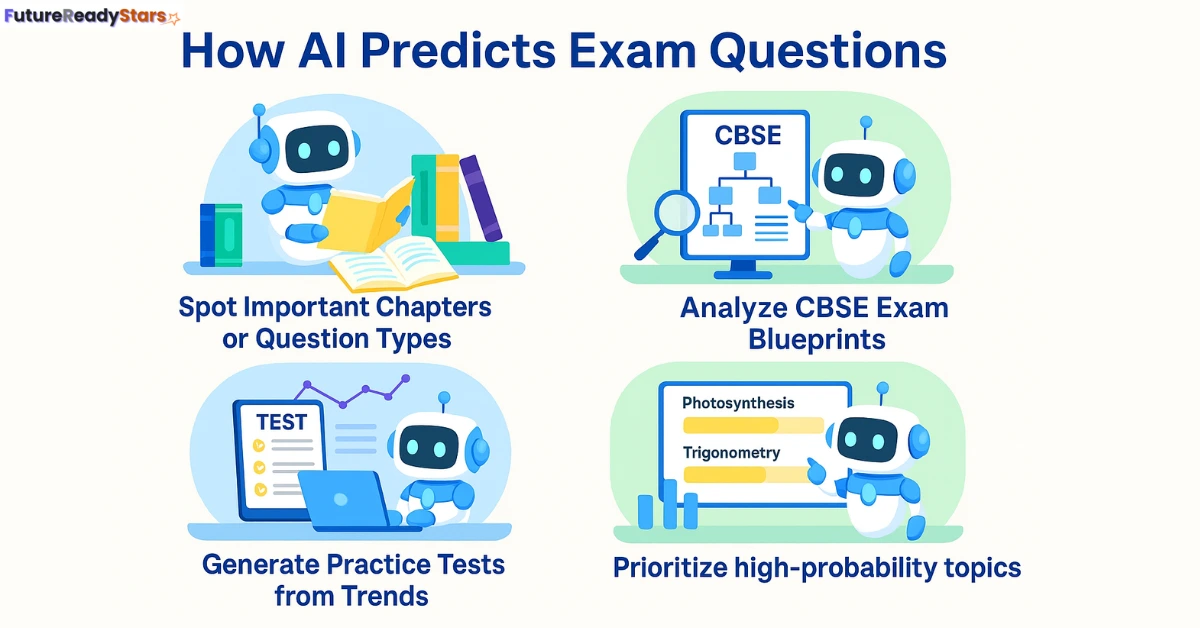Last updated: Jan 2026
Are there AI tools that genuinely help CBSE students practice smarter and generate syllabus-aligned question sets? In 2025, these tools go beyond basic summaries to help with concept practice, quiz creation, and targeted revision — based on past papers and NCERT patterns.
As a CBSE tutor myself, I’ve seen firsthand how students struggle to identify important topics, especially during final revision. In the past year, I’ve explored several AI-powered tools with my students—and to my surprise, many actually helped us narrow down possible exam questions based on previous years’ papers, patterns, and CBSE guidelines.
In this post, I’ll walk you through best AI Tools for Smarter Exam Preparation (2026), along with tips on how to use them wisely. Whether you’re a student, a teacher, or a parent trying to support your child, this guide will help you stay one step ahead.
This guide reflects the latest CBSE syllabus trends, AI tool updates, and exam-oriented study practices for the 2025–26 academic year.
Why Students Are Searching for Best AI Tools for CBSE Exam Practice & Smart Revision
With CBSE’s structured pattern and weightage system, AI can analyze trends across years—from NCERT textbooks, sample papers, and even previous toppers’ answers—to identify key questions likely to appear.
Here’s what AI can do:

- Spot important chapters or question types
- Analyze exam blueprints
- Generate practice tests based on real trends
- Prioritize topics with higher probability
In short, AI doesn’t “leak” questions—it helps you prepare smarter.
Also Read: Top 20 ‘No Internet Needed’ AI Tools Bridging the Digital Divide in 2025Top AI Tools for CBSE Practice & Question Generation (2025)
Below are tools that I’ve tested or found useful as a CBSE tutor. I’ve included platforms, pricing, and how students or teachers can use them effectively.
1.PrepAI
Best for: Creating question papers from NCERT text
Platform: Web
Free/Paid: Free trial + paid plans
Why it works: PrepAI lets you input your chapter or notes and instantly generate MCQs, short and long questions. It’s smart enough to analyze NCERT-style questions, which is helpful for CBSE prep.
🧠 Tutor Tip: I used this to generate extra questions for my Class 10 science students. It mimicked CBSE board question tone surprisingly well.
2. Edmodo’s AI Quiz Generator
Best for: Teachers creating tests based on patterns
Platform: Web
Free/Paid: Free
Teachers using Edmodo can generate quizzes based on student history and syllabus. It pulls from a question bank aligned with CBSE chapters.
3.Questgen AI
Best for: Automatic MCQ and QA generation
Platform: Web, API
Free/Paid: Free limited use
Questgen’s NLP model identifies possible questions from a passage. CBSE students can copy NCERT paragraphs and create questions that reflect board-level expectations.
4.Mindgrasp.ai
Best for: Students summarizing and understanding concepts
Platform: Web
Free/Paid: Free trial + Paid
Mindgrasp doesn’t predict questions directly, but helps you grasp concepts, then test yourself with AI-generated questions. Ideal for last-minute smart revision.
5.MagicSchool AI (Teacher-Focused)
Best for: CBSE teachers predicting student-level questions
Platform: Web
Free/Paid: Free
Although built for US classrooms, MagicSchool’s AI can be adjusted to Indian standards. Teachers can enter topics like “CBSE Class 9 Electricity” and get predicted questions based on difficulty level.
6.Socratic by Google
Best for: Doubt-solving + pattern recognition
Platform: App
Free/Paid: Free
Socratic can’t generate question papers, but it helps spot repeated patterns in textbook problems and NCERT solutions.
7.Teachmint AI (India-Focused)
Best for: Indian curriculum prediction tools
Platform: Web + App
Free/Paid: Free
Teachmint now offers AI-based classroom tools. It can assess question trends and help CBSE teachers predict key chapters and structure tests accordingly.
Also read: Top 15 Banned AI Tools Students Love (Why Schools Can’t Stop Them)Best AI Tools for CBSE Exam Practice & Smart Revision (2026)
“AI doesn’t replace hard work—it helps you work smarter.”
Here’s how I guide my students:
- Use AI to spot trends, not memorize questions.
- Cross-check AI-generated content with actual NCERT guidelines.
- Balance AI help with mock papers and handwritten notes.
Most importantly, avoid over-relying on predictions. AI is a guide, not a shortcut.
Also read: Top 10 AI Gadgets for Students in 2025Case Study: Class 10 Student Success
One student used these AI tools to generate targeted practice questions from past papers and NCERT content. Over 70% of the practice focus areas aligned with important topics in their pre-board exams — boosting confidence and scores
The result? Improved confidence and a 15% score boost compared to mid-terms.
Common Questions
Q. Is using AI for exam prediction cheating?
No. These tools help identify important topics and question types, just like any test series or guidebook. You still need to study and understand the answers.
Q. Are these tools accurate for CBSE?
They’re not 100% accurate, but useful. They improve your chances by focusing revision on high-probability areas.
Q. Can I use them offline?
Some tools like Mindgrasp and Socratic have app-based support, but full functionality may require internet.
Final Thoughts
As a CBSE tutor from a rural background, I’ve seen firsthand how AI tools can bridge the gap between limited resources and real academic success. These tools aren’t just for big coaching centers—they’re now accessible and useful for every student, even in small towns and villages.
If you’re a student, use AI not just to predict questions—but to revise smartly, understand deeply, and prepare confidently. If you’re a teacher or parent, explore these tools to support your students without extra stress or cost.
My Tip: Start with one AI tool that feels simple and helpful. Use it daily during revision and track how your performance improves.
If you’re still wondering which is the best AI for predicting CBSE exam questions, choose one that fits your class level, subject needs, and device type.
Want more tools to boost your learning or teaching?
Read this next: How I Built a No-Code AI Chatbot for CBSE & US Education
🌐 Visit FutureReadyStars.com — where I regularly share trusted tools, tips, and resources for CBSE students and educators.
Let’s make AI the bridge—not the barrier—to better education.


3 thoughts on “Best AI Tools for CBSE Exam Practice & Smart Revision (2026)”